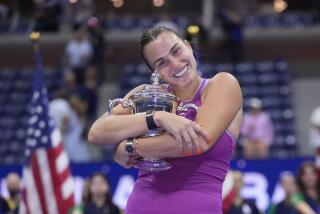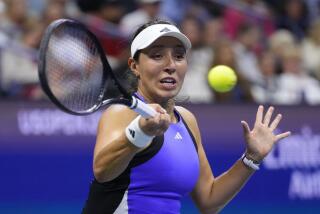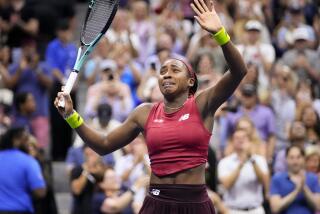Martina Upset by Maleeva : U.S Open: Magdalena, 17, eliminates Navratilova as her sister, Manuela, did in 1990.
NEW YORK — The sky was the color of gray flannel. It was rainy and gloomy. It was, therefore, a perfect day for a stunning upset at the U.S. Open, where thunder shook the stands and rolled through the women’s draw, knocking out 35-year-old Martina Navratilova.
Ranked No. 3 in the world, four times a winner and four times a finalist in her 19 previous U.S. Open appearances, Navratilova was upended Thursday by 17-year-old Magdalena Maleeva, 6-4, 0-6, 6-3, in a second-round match that was fairly bursting with repercussions on Navratilova’s career.
It was Navratilova’s worst defeat in a Grand Slam event since she lost in the first round of the 1976 U.S. Open, a span of 50 Grand Slam tournaments.
It seemed to take its toll on MEN: Jim Courier outlasted two rain delays and came back to beat Andrei Chesnokov, 4-6, 6-3, 6-3, 6-1. C2
Navratilova, who rushed to the locker room after the match to cry. Her eyes were red and puffy when she met the press.
“It could be, possibly, my last Grand Slam event,” she said. “I mean, I don’t know.”
This was eerily similar to what Navratilova said when she lost to Magdalena’s sister, Manuela, on the same court in the fourth round of the 1990 U.S. Open. At that time, Navratilova also hinted she might pack it in.
When asked if she really meant she might not be back, Navratilova backed off a little.
“It could be anybody’s last Grand Slam,” she said. “I don’t know if I am going to be here tomorrow. You could walk down the street and get hit by a cab. I mean . . . when you are 35, the time is running out.
“I don’t know how much I have in the head and heart and legs. I don’t know. But if I was 17 years old, I certainly wouldn’t think that this is my last Grand Slam.
“I am planning on playing a full schedule next year, (but) it is pretty hard to think about next year when you lose in the second round like this.”
There won’t be many magic moments from this match on Martina’s lifetime highlight reel. She blew the first set with consecutive double faults.
“She was very, very nervous,” Maleeva said.
Navratilova admitted as much, but bristled when asked why.
“Come on, do I have to spell it out for you?” Navratilova said. “What has she got to lose and what do I have to lose? For her, it’s the match of her life. (For me) it is a second-round match.”
In any event, Navratilova looked for a while as if she had recovered. She ripped through Maleeva in a 24-minute second set, then just as quickly became tentative once again when play resumed after a rain delay in the first game of the third set.
At 2-2, she had two break-point chances on Maleeva’s serve and blew both. In Navratilova’s next service game, she held a 40-love lead and wound up getting broken.
“It is just one of those days,” Navratilova said. “You can’t give away so many breaks or game points. I just didn’t close the door when I had the opportunities. God knows, I had the opportunities.”
Navratilova was 0 for 5 on break points in the third set and four for 13 for the match.
Thus fortified, Maleeva gratefully accepted a 4-2 lead and carried the one-break margin into her final service game. It was quickly 40-15, but a double fault made it 40-30. On the next serve, Navratilova rushed a nervous forehand return, sent the ball softly into the bottom of the net and it was over.
Maleeva raised her arms in triumph, savoring a victory over her favorite player and the meaning it might carry.
“I don’t know if it proves to anyone else that I am good, but it proves to me, so that is the most important thing,” said Maleeva, who is ranked 17th.
Navratilova shook hands with Maleeva, patted her on the back, then stood silently in front of her courtside chair, removed her glasses and shook her head.
Even if this really isn’t her last U.S. Open, she knows there can’t be too many more. Next month, she turns 36--20 years older than Jennifer Capriati, who is ranked three spots behind her at No. 6.
In tennis, Navratilova is positively ancient and defeats such as a second-round cruncher at the U.S. Open tend to carry a lot more weight than making it to the semifinals at Wimbledon, which Navratilova did only two months ago, or beating No. 1-ranked Monica Seles for the title in the Virginia Slims of Los Angeles three weeks ago.
Whatever Navratilova we see, though, Maleeva was impressed.
“I don’t believe that she is so old and so good,” Maleeva said.
Navratilova managed a thin smile. “If you asked me after L.A., I would say, yeah, I could play five more years,” she said. “Ask me now, I don’t know if I could get out of bed tomorrow.”
Open Notes
Second-seeded Steffi Graf worked harder than she might have expected to post a 7-5, 6-3 victory over Pam Shriver. . . . Martina Navratilova’s second-round loss to Magdalena Maleeva was her first in three meetings and lowered her record against the Maleeva sisters--17-year-old Magdalena, 23-year-old Katerina and 25-year-old Manuela--to 18-4. Until Thursday, Navratilova’s most memorable loss to a Maleeva was in the fourth round of the 1990 U.S. Open when Manuela won, 7-5, 3-6, 6-3. “I am glad she is the last one,” Navratilova joked. “I guess I will be one of the few players that has lost to all of them, at least once anyway. I beat the mother anyway. I never lost to the mother.” Navratilova said she defeated Julia Berberian, mother of the Maleevas, in 1970. “I didn’t beat her badly,” Navratilova said. “She managed to have three daughters after that.”
More to Read
Go beyond the scoreboard
Get the latest on L.A.'s teams in the daily Sports Report newsletter.
You may occasionally receive promotional content from the Los Angeles Times.










